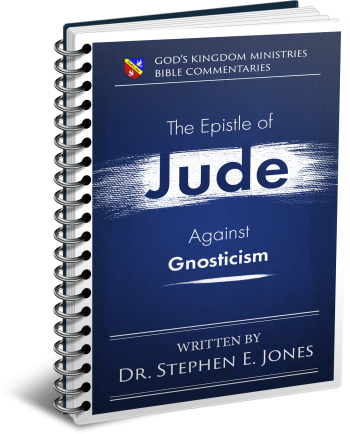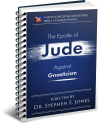Latest Posts
View the latest posts in an easy-to-read list format, with filtering options.

Jesus' brother, Jude, wrote a letter to the Jewish Christian congregations in the first century, warning them about Gnosticism and also urging them to stand firm in faith against their Jewish critics.
Category - Bible Commentaries

When Jude compared the Gnostics to “clouds without water,” “autumn trees without fruit,” and “wandering stars” (Jude 12, 13), he may have been influenced by the book of Enoch, which says in chapters 2 and 3,
Chapter 2:
1 Observe ye everything that takes place in the heaven, how they do not change their orbits, and the luminaries which are in the heaven, how they all rise and set in order each in its season, and 2 transgress not against their appointed order. Behold ye the earth and give heed to the things which take place upon it from first to last, how steadfast they are, how none of the things upon earth 3 change, but all the works of God appear to you. Behold the summer and the winter, how the whole earth is filled with water, and clouds and dew and rain lie upon it.
Chapter 3:
Observe and see how (in the winter) all the trees seem as though they had withered and shed all their leaves, except fourteen trees, which do not lose their foliage but retain the old foliage from two to three years till the new comes.
These short chapters allude to the same themes found in Jude 12 and 13, including the reference to the fixed stars that “do not change their orbits.” This, of course, is contrasted with the planets, which appear to “wander” in the heavens.
Having finished making a series of analogies about the Gnostics, Jude then quotes directly from the book of Enoch, saying in Jude 14 and 15,
14 And about these also Enoch, in the seventh generation from Adam, prophesied, saying, “Behold, the Lord came with many thousands of His holy ones, 15 to execute judgment upon all, and to convict all the ungodly of all their ungodly deeds which they have done in an ungodly way, and of all the harsh things which ungodly sinners have spoken against Him.”
This is found in Deut. 33:2, which Moses wrote, but this is also a direct quotation from Enoch 1:9, which says,
9 And behold! He cometh with ten thousands of His holy ones to execute judgement upon all, and to destroy all the ungodly:
And to convict all flesh of all the works of their ungodliness which they have ungodly committed, and of all the hard things which ungodly sinners have spoken against Him.
The passage in Enoch is about the end of days when God comes upon Mount Sinai to judge the whole earth but to preserve and bless the saints. The book opens this way:
1 The words of the blessing of Enoch, wherewith he blessed the elect and righteous, who will be 2 living in the day of tribulation, when all the wicked and godless are to be removed.
Scholars debate whether Enoch himself wrote this or if someone later used his name as a pseudonym. Jude appears to treat it as a genuine prophecy from Enoch himself “in the seventh generation from Adam.” Jude was quoting the man and not merely the book, and he believed that Enoch had prophesied about Mount Sinai many centuries before the Israelites arrived there under Moses’ leadership.
If we accept the view that the book of Enoch is genuine, a secondary question is how much of the book of Enoch was actually written by Enoch himself and how much was added by others later. It was common for men in those days not only to write entire books under a pseudonym but also to embellish existing books, claiming that their version is a “complete” copy previously hidden from the public.
Most scholars believe that the later chapters were greatly influenced by the religion of Babylon and thus conclude that it was written or embellished by a later Jew during or after the Babylonian captivity. Whatever the case, Jude apparently believed that the first few short chapters were authentic prophecies from Enoch himself. Yet because we cannot study the complete text used by Jude, we can only draw conclusions from those early portions of the book that Jude actually quoted or referenced.
If at least this portion of the book of Enoch is to be accepted as genuine, then Moses referenced it in Deut. 33:1-3 (KJV), saying,
1 And this is the blessing wherewith Moses the man of God blessed the children of Israel before his death. 2 And he said, “The Lord came from Sinai and rose up from Seir unto them; He shined forth from mount Paran, and He came with ten thousands of saints; from His right hand went a fiery law for them. 3 Yea, He loved the people; all His saints are in Thy hand; and they sat down at Thy feet; every one shall receive of Thy words.
This is quite similar to the opening statement in the book of Enoch, where we read: “The words of the blessing of Enoch.” Deuteronomy 33 is the blessing of Moses upon the twelve tribes. Enoch speaks of the judgment of God upon the ungodly, while Moses speaks of the “fiery law” by which judgment is rendered. However, Moses says little about the ungodly, focusing primarily upon blessing “all His saints.”
Both the “fiery law” (esh dath) and the saints are said to be in God’s hand, which shows that the saints themselves are those in whose hearts the law of God is written by fire. By being in agreement with Him and showing forth the divine nature, they become agents of divine judgment upon the ungodly. So Paul says in 1 Cor. 6:2, “do you not know that the saints will judge the world?”
More than that, Paul says in the next verse, “Do you not know that we shall judge angels?” We cannot help but wonder if Paul too had read the Book of Enoch, which says in 1:5,
5 And all shall be smitten with fear and the Watchers shall quake, and great fear and trembling shall seize them unto the ends of the earth.
Later, we read in chapter 10 of Enoch that the fallen angels were called “Watchers” and the Nephilim were called “children of the Watchers.” We cannot say if Paul was referring to these “Watchers” or if he had some special revelation about judging angels. Nonetheless, we note that Paul’s belief was close to that found in Enoch.
We should also note a contrast between Enoch and Moses (in Deuteronomy). Moses blessed the twelve tribes and prophesied of their destiny but says nothing about Sinai being the place of the final judgment. Enoch, however, implies that Sinai will be the place of the Great White Throne judgment.
In Daniel 7:10, where the Ancient of Days comes to judge the earth, there is no mention of any specific location. The same is true when John refers to the same scene in Rev. 20:11. For Enoch, the gathering place for divine judgment is Sinai; but Heb. 12:22 (KJV) says it is Mount Sion, the place where Jesus was transfigured. Sion is not Zion, as the NASB would have it, but Mount Hermon (Deut. 4:48).
Mount Sinai is in Arabia, Paul says in Gal. 4:25—not in the Sinai peninsula, which is part of Egypt. Paul should know, since he went there to receive his revelation of the law and the New Covenant (Gal. 1:17). No doubt he sat in the cave where Elijah too met God (1 Kings 19:8, 9). But Sinai was also the inheritance of Ishmael, not of Isaac, and its Mount represented Hagar, not Sarah. The glory of God’s presence, then, moved from Sinai in Arabia to Zion in Jerusalem and ultimately to Sion, or Hermon.
Nonetheless, Jude 14 and 15 (quoting Enoch) tells us that Mount Sinai was the place of divine judgment—at least in the days of Moses.
He says further in Jude 16,
16 These are grumblers, finding fault, following after their own lusts; they speak arrogantly, flattering people for the sake of gaining an advantage.
The “grumblers” were the Israelites in Moses’ day, those who complained whenever their faith was tested in the wilderness. Exodus 15:24 says,
24 So the people grumbled at Moses, saying, “What shall we drink?”
Again, we read in Exodus 16:2,
2 And the whole congregation of the sons of Israel grumbled against Moses and Aaron in the wilderness.
In Numbers 14:29 God judged Israel for their grumbling, or murmuring,
29 Your corpses shall fall in this wilderness, even all your numbered men, according to your complete number from twenty years old and upward, who have grumbled against Me.
It is clear, then, that the grumblers being judged were the Israelites, also known as “the church in the wilderness” (Acts 7:38, KJV). They all had faith in the blood of the lamb (Passover), which sent them on their journey to the Promised Land, but their faith was insufficient to finish their journey. When God tested their faith, they failed every time (Num. 14:22).
This is much like the Church today, which, as a body, left “Egypt” when Jesus died on the cross as the Passover Lamb, but which again failed the wilderness tests. When trials hit, most of them murmured and complained once again, finding fault with God and with those called to lead them to the Promised Land. They did not understand that “God causes all things to work together for good” (Rom. 8:28).
Jude 16 then condemns those who “speak arrogantly, flattering people [i.e., flattering or bribing the judges] for the sake of gaining an advantage.” Scholars suggest that Jude here was referencing The Assumption of Moses (or The Testament of Moses), which reads in chapter 5,
And many in those times shall have respect unto desirable persons and receive gifts, and pervert judgment [on receiving presents]. And on this account the colony and the borders of their habitation shall be filled with lawless deeds and iniquities: those who wickedly depart from the Lord shall be judges: they shall be ready to judge for money as each may wish.
This book condemns those who give gifts to judges (usually, priests) as an offering to the Lord, hoping to gain favor in the courts. No doubt Jude was familiar with The Assumption of Moses, but he would not have needed to quote from it, as God gave clear instructions to judges in the law. Exodus 23:8 says,
8 And you shall not take a bribe, for a bribe blinds the clear-sighted and subverts the cause of the just.
Injustice has always been a problem in the world. As long as there are judges who desire wealth, power, or prestige more than justice, the courts will favor the rich and powerful and pervert the cause of the poor and helpless.
Jude tells us that those who seek an unjust advantage will be brought to judgment in the end.